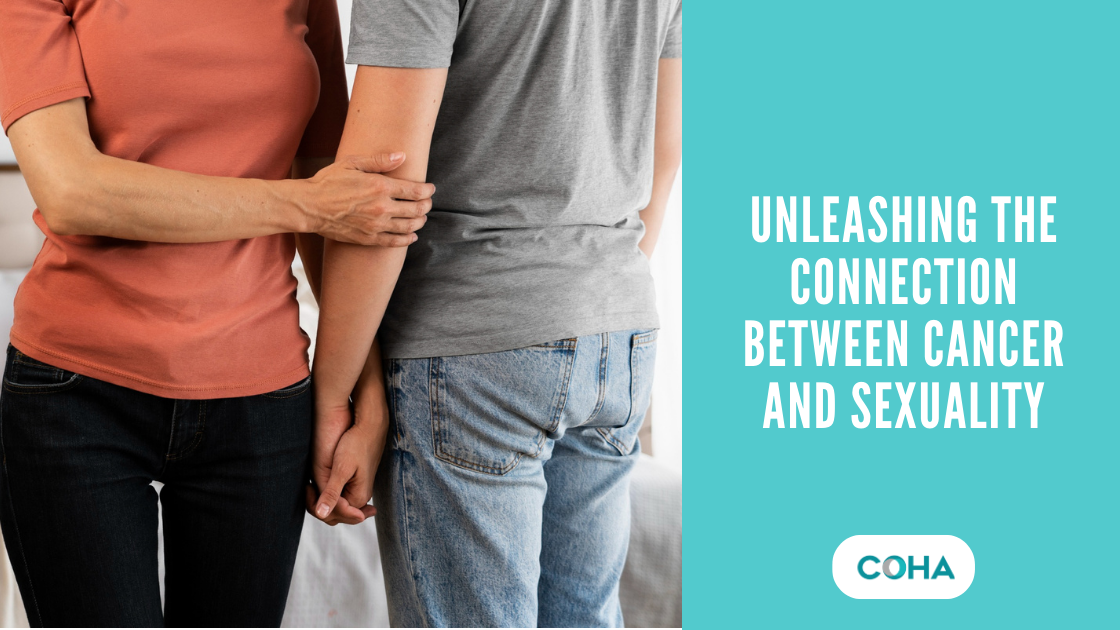


When you are diagnosed with cancer and have to undergo treatment, you may often think about the potential complications of the treatment, managing side effects, and striving for recovery. Nevertheless, one often overlooked topic in cancer treatment is the patient's sexual health. Cancer treatments may impact the patient’s sexual desire, leading to a lack of interest in sexuality and intercourse. Addressing this issue is vital in improving patients' overall health and quality of life throughout their cancer journey.
Let us discuss how cancer and sexuality are interlinked, exploring the psychological effects and how to cope with them for a healthy and happy future.
Intimacy and sexual health are equally crucial for cancer patients as for those without cancer. They help cancer patients combat emotional distress that may arise during diagnosis and treatment, enabling them to navigate treatment challenges with greater success.
Nonetheless, we must agree that cancer and its treatments can impact a person's sexual well-being, including their body function, body image, and sexual desire. Besides, cancer may also influence the way an individual exhibits their sexuality. The physical and psychological repercussions of cancer and its treatments can cause sexual difficulties.
While some therapies and surgeries may have less impact on an individual's sexual desire, function, and overall sexuality, others can have a significant impact on specific body parts, nerve function, or hormone levels, decreasing the libido. Also, some treatments may present side effects like bowel or bladder issues, nausea, fatigue, pain, and changes in appearance. All these can potentially affect one's sexuality.
Not all individuals diagnosed with cancer will experience changes in their sexual desire or their perception regarding their sexuality. While some may not have any changes, others may observe changes in their body image, consequently feeling less attractive, which in turn decreases their sexual desire.
Though some patients may lack interest in sex life and feel exhausted, others may express an increased desire for intercourse and other sexual activities. If you are married or in a relationship, a crisis like cancer may also strengthen your bond, bringing you and your partner closer together.
As different patients have different sexual preferences, it is challenging to determine precisely how cancer will impact one's sexuality and sex life. The influence of specific cancer types and their treatments on one's sexual desire or ability may vary.
Cancer and intimacy go hand-in-hand, as the condition and its treatments can have a profound impact on various aspects of sexual well-being, including sensations and body image. For instance, individuals who have undergone a mastectomy (surgical removal of the cancerous breast) may perceive their bodies differently. This can make it challenging to engage in sexual activities or feel intimate with their partners.
Most women come to know about their gynaecological cancers after intercourse when they are bleeding after sex. These women may think having intercourse can be a traumatic experience for them. If a man has prostate cancer and struggles with erectile dysfunction, talking or thinking about sex can be embarrassing for him.
Cancer treatment can cause the following emotional side effects that impact your sexuality:
Common problems for men and women after cancer treatment:
Common problems in men:
Common problems in women:
Sexual changes during or after cancer treatment can improve over time and often won’t be permanent. If you have intercourse during chemotherapy, use condoms or dental dams (for oral sex), as chemo drugs can be present in vaginal fluid or semen. Remember, pregnancy during or shortly after chemotherapy can complicate childbirth. Talk to your healthcare provider to know what changes you will experience and how to prepare for them.
At Chesapeake Oncology-Hematology Associates, we recognize the importance of sexuality for cancer patients during and after treatment. So, along with our all-inclusive cancer treatment, we offer specialized advice and tips on improving their sexual health. Contact us today to maintain a fulfilling sexual life during and after your cancer treatment.
It is recommended to refrain from kissing while undergoing radiation therapy. However, it is generally safe to kiss while on chemotherapy.
Generally, relationships may experience changes in responsibilities, emotional and physical needs, and intimacy and sex.
Prostate cancer may decrease your libido.
It means individuals (family, friends, or spouse) who were once supportive are suddenly withdrawing contact or distancing themselves from cancer patients/survivors.
It is common for patients undergoing treatment to lose interest in sex due to bodily changes and emotional effects. However, it is often a short-term issue.